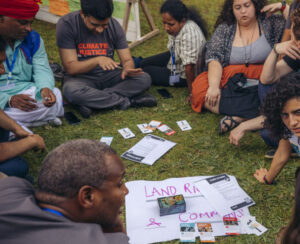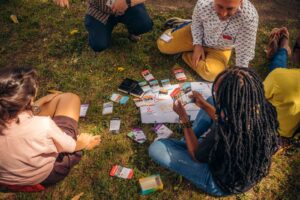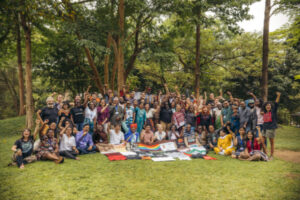Minds of the Movement
An ICNC blog on the people and power of civil resistance
by Peter Tindborg and Amber French-GrietteMay 04, 2023
"Writing ourselves into humanhood."
"To build towards a more meaningful future."
"A labor of love for our struggle."
"Catharsis..."
What is your relationship to writing and how is that related to your activism? We received the above responses when we discussed this question with activists we met this past February at the Global People Power Forum (Tanzania), a space where movements and movement-minded organizations shared, learned and advanced collective wisdom.
As ICNC and ActionAid Denmark embark on a new collaboration this year, we are going straight to the source. Even in this first phase the approach has brought forth a true wellspring of ideas.
Our collaboration, "Research In Action" or REACT for short, was conceived as a global research program with the goal to create useful knowledge from and for nonviolent movements. The collaboration is based on four key principles:
-
- Addressing understudied areas and research lesser-known cases and realities
- Engaging activists as authors and guest editors
- Focusing on issues, collaborators, cases, networks and stories from outside the Global North
- Experimenting with new engaging formats
Writing is a central building block of our collaboration. We—the REACT team alongside a dozen activist-authors from all world regions—will use Minds of the Movement as a space to explore, express, exchange and elaborate. Over the coming weeks, keep an eye out for a series of posts by these activists. They are engaged in nonviolent movements for diverse causes, but they all have one thing in common: A relationship to writing that transcends the personal and ventures well into the domain of collective power.
If language is power, then writing is revolution.
Collaborative action-research

Global People Power Forum, Tanzania, February 2023. Credit: ActionAid Denmark.
Another building block of our collaboration is applied research.
The aim of research should be to come up with propositions, lessons and models that fit the current reality. In our context, this means learning from the practical experiences of activists and organizers on the ground, sharing lessons and insights, and engaging people in research through conversations, audiovisual means and activist stories—or activist realities, as one activist suggested recently—that not only inspire but also guide.
Activists not only offer experiences to be considered from a detached perspective; they offer critical thinking, analysis, frameworks and direction. This should all be part and parcel of wider research. We feel this blog is a pretty good platform for collaborative thinking and for sharing cross-cutting ideas.
We are creating a research process to initially capture the essence of our exchanges in short-form and long-form writing (i.e., ICNC blog posts and reports), then ultimately in different learning materials and opportunities.
First steps

Global People Power Forum, Tanzania, February 2023. Credit: ActionAid Denmark.
Over the past few months, we have involved movement-minded scholars, civil society actors and activists in a series of brainstorming meetings to generate research questions to guide the program. Among the dozens of research questions we've identified are:
-
- How are movements influencing public narratives and policy development?
- Where are the successful experiences in transnational campaigning and organizing across borders?
- How do we measure and counter repression, considering its diverse tactics?
- What is the role of ideology and popular education in grassroots organizing?
We are now initiating conversations with activists from our global network around their particular struggles, networks, relationships to writing, and types of data that would support their work.
Through these initial conversations, we hope to create a feedback mechanism for ensuring that our research agenda remains of utmost relevance to activist communities. We have also begun engaging activists—particularly who are bilingual and can thus bridge language divides— as guest editors of mini-series of blog posts for the REACT collaboration.
Activist stories, activist realities

Global People Power Forum, Tanzania, February 2023. Credit: ActionAid Denmark.
A recurring theme in our initial conversations with activists who are part of the REACT collaboration has been that writing is an endeavor to humanize communities that are engaged in nonviolent resistance.
In her keynote “The Transformative Power of Storytelling” at the Human Rights Forum 2021, Aya Chebbi, ICNC alumna, former political blogger during Tunisia’s Revolution, and today an internationally recognized speaker and diplomat, stated:
“I really want us to reach a point where we respect people to tell their own stories in their own words in their own context. If we can amplify it, that will make those voices the mainstream, not the exception.”
By amplifying activist-authors’ writing and connecting it to applied research, the REACT collaboration offers channels for this humanizing work—this “transformative power”—to coalesce. The collaboration also aspires to highlight the value of movements as meaning makers and to challenge what we understand to be the “political effectiveness” of movements. We recognize that movement impact takes place at the level of culture, theory and meaning, in addition to more traditional political outcomes—for instance, concrete demands, policy changes and campaigns. A forthcoming REACT mini-series led by guest editor Araceli will explore this in the Latin American context.
Besides, this has been the number one accomplishment of the now 265 posts that Minds of the Movement has published since launch in 2017. The blog is a multi-author platform featuring more than 120 contributors’ voices, among whom at least 63 identify primarily as activists, and at least 58 of all contributors were born in the Global South. This work thus already began years ago, and now we are ready to take it to a whole new level with the REACT series!
At the same time, while it is useful for activist readers to have access to distilled ‘key learnings’ and ‘best practices’ in short, condensed formats, we aren’t going to stop there. Short-form writing is a great way to quickly amplify, diffuse and share inspiration, but some activist-authors may find the format frustrating. They may find blog posts limiting; it may feel too much like a ‘toolbox’ approach to their work or they may feel that it reduces their experience to something too generic, disconnected from their struggles. Longer musings, thick historical overviews and in-depth discussion of theories, values and norms are just as important to consider as a particular tool, tactic, lesson or case.
That’s why, in the long term, we envision growing the REACT collaboration to include long-form writing, as well as other types of collaboration, in particular peer learning and practicum opportunities.
Above all, we hope that our collaboration will provide space for activists to write themselves into humanhood—to recognize our humanity beyond what top-down structures have been dictating to us thus far in the human journey we've all embarked upon.
Check back soon for our first post in the REACT series, powered by ActionAid Denmark!

Peter Tindborg
Peter Tindborg is a guest editor for the REACT series powered by ActionAid Denmark. He has been engaged in youth organizing and activism for more than a decade out of Denmark, Bolivia, Kenya, Nepal and El Salvador. He is currently at the Global Centre for Social Movement Support as part of ActionAid Denmark and serves as co-editor of Minds of the Movement’s REACT blog series, powered by ActionAid Denmark.
Read More
Amber French-Griette
Amber French is Co-founder and President of the Organization for Nonviolent Movements (ONM), an ICNC partner organization based in Paris, France. From 2014 to 2025, she was Senior Editorial Advisor at ICNC, Co-Founding Editor of the Minds of the Movement blog (est. June 2017) and Project Co-Lead of REACT (Research-in-Action) focusing on the power of activist writing. Currently based in Paris, France, she leads ONM and continues to develop thought leadership on civil resistance in French.
Read More